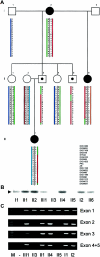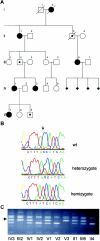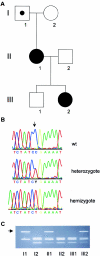Mutations of the ephrin-B1 gene cause craniofrontonasal syndrome
- PMID: 15124102
- PMCID: PMC1182084
- DOI: 10.1086/421532
Mutations of the ephrin-B1 gene cause craniofrontonasal syndrome
Abstract
Craniofrontonasal syndrome (CFNS) is an X-linked craniofacial disorder with an unusual manifestation pattern, in which affected females show multiple skeletal malformations, whereas the genetic defect causes no or only mild abnormalities in male carriers. Recently, we have mapped a gene for CFNS in the pericentromeric region of the X chromosome that contains the EFNB1 gene, which encodes the ephrin-B1 ligand for Eph receptors. Since Efnb1 mutant mice display a spectrum of malformations and an unusual inheritance reminiscent of CFNS, we analyzed the EFNB1 gene in three families with CFNS. In one family, a deletion of exons 2-5 was identified in an obligate carrier male, his mildly affected brother, and in the affected females. In the two other families, missense mutations in EFNB1 were detected that lead to amino acid exchanges P54L and T111I. Both mutations are located in multimerization and receptor-interaction motifs found within the ephrin-B1 extracellular domain. In all cases, mutations were found consistently in obligate male carriers, clinically affected males, and affected heterozygous females. We conclude that mutations in EFNB1 cause CFNS.
Figures





Similar articles
-
The impact of CFNS-causing EFNB1 mutations on ephrin-B1 function.BMC Med Genet. 2010 Jun 17;11:98. doi: 10.1186/1471-2350-11-98. BMC Med Genet. 2010. PMID: 20565770 Free PMC article.
-
Twenty-six novel EFNB1 mutations in familial and sporadic craniofrontonasal syndrome (CFNS).Hum Mutat. 2005 Aug;26(2):113-8. doi: 10.1002/humu.20193. Hum Mutat. 2005. PMID: 15959873
-
Mutations of ephrin-B1 (EFNB1), a marker of tissue boundary formation, cause craniofrontonasal syndrome.Proc Natl Acad Sci U S A. 2004 Jun 8;101(23):8652-7. doi: 10.1073/pnas.0402819101. Epub 2004 May 27. Proc Natl Acad Sci U S A. 2004. PMID: 15166289 Free PMC article.
-
Clinical and genetic aspects of craniofrontonasal syndrome: towards resolving a genetic paradox.Mol Genet Metab. 2005 Sep-Oct;86(1-2):110-6. doi: 10.1016/j.ymgme.2005.07.017. Mol Genet Metab. 2005. PMID: 16143553 Review.
-
Diverse clinical and genetic aspects of craniofrontonasal syndrome.Pediatr Neurol. 2011 Feb;44(2):83-7. doi: 10.1016/j.pediatrneurol.2010.10.012. Pediatr Neurol. 2011. PMID: 21215906 Review.
Cited by
-
CNV analysis in 169 patients with bladder exstrophy-epispadias complex.BMC Med Genet. 2016 Apr 30;17(1):35. doi: 10.1186/s12881-016-0299-x. BMC Med Genet. 2016. PMID: 27138190 Free PMC article.
-
Identification and expression analysis of a novel intragenic EFNB1 mutation causing craniofrontonasal syndrome.Meta Gene. 2013 Nov 28;2:25-31. doi: 10.1016/j.mgene.2013.11.001. eCollection 2014 Dec. Meta Gene. 2013. PMID: 25606386 Free PMC article.
-
New Insights into the Roles of Nogo-A in CNS Biology and Diseases.Neurochem Res. 2015 Sep;40(9):1767-85. doi: 10.1007/s11064-015-1671-5. Epub 2015 Aug 13. Neurochem Res. 2015. PMID: 26266872 Review.
-
The origin of EFNB1 mutations in craniofrontonasal syndrome: frequent somatic mosaicism and explanation of the paucity of carrier males.Am J Hum Genet. 2006 Jun;78(6):999-1010. doi: 10.1086/504440. Epub 2006 Apr 28. Am J Hum Genet. 2006. PMID: 16685650 Free PMC article.
-
Evaluation of Sporadic and Familial Cases with Craniofrontonasal Syndrome: A Wide Clinical Spectrum and Identification of a Novel EFNB1 Gene Mutation.Mol Syndromol. 2021 Aug;12(5):269-278. doi: 10.1159/000515697. Epub 2021 Jul 12. Mol Syndromol. 2021. PMID: 34602953 Free PMC article.
References
Electronic-Database Information
-
- Ensembl Genome Server, http://www.ensembl.org (for EFNB1 [accession number ENSP00000204961])
-
- GenBank, http://www.ncbi.nlm.nih.gov/Genbank (for EFNB1 reference sequence [accession number XM_038809])
-
- LocusLink, http://www.ncbi.nlm.nih.gov/LocusLink (for EFNB1 [accession number 1947])
-
- NCBI Molecular Variation Database (dbSNP), http://www.ncbi.nlm.nih.gov/SNP
-
- Online Mendelian Inheritance in Man (OMIM), http://www.ncbi.nlm.nih.gov/Omim
References
-
- Devriendt K, van Mol C, Fryns JP (1995) Craniofacial dysplasia: a more severe expression in the mother than in her son. Genet Couns 6:361–364 - PubMed
-
- Feldman GJ, Ward DE, Lajeunie-Renier E, Saavedra D, Robin NH, Proud V, Robb LJ, Der Kaloustian V, Carey JC, Cohen M, Cornier V, Munnich A, Zackai EH, Wilkie AOM, Price RA, Muenke M (1997) A novel phenotypic pattern in X-linked inheritance: craniofrontonasal syndrome maps to Xp22. Hum Mol Genet 6:1937–194110.1093/hmg/6.11.1937 - DOI - PubMed
Publication types
MeSH terms
Substances
Associated data
- Actions
LinkOut - more resources
Full Text Sources
Other Literature Sources
Medical
Molecular Biology Databases
Miscellaneous

